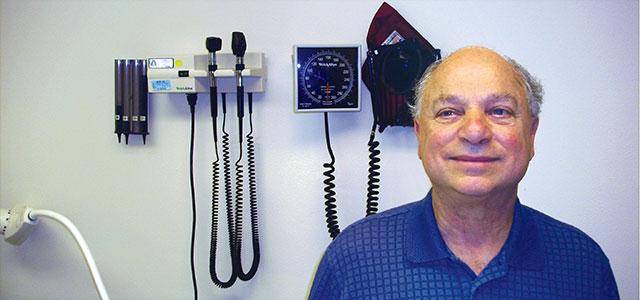
Steven Leiner, family nurse practitioner at Mission Neighborhood Health Center
What Volunteer Clinical Faculty Do: Steven Leiner and Family Nursing
Volunteer clinical faculty and preceptors offer students individual perspectives and hands-on experience in a variety of health care settings and specialties. The cumulative effect of what these volunteers impart plays a significant role in the care any health system delivers. This series aims to shed light on the unique roles these valuable mentors play. This month we hear from Steven Leiner, family nurse practitioner at Mission Neighborhood Health Center.
After I graduated from the University of Chicago (with a BA in history), I wanted to see the world. For six and a half years I traveled throughout Europe and Asia, supporting myself by a variety of jobs. I thrived among underserved communities but thought nursing would be a more useful profession. At the time, I had little familiarity with nursing; although my mother was a nurse, it wasn’t something we talked about regularly. So I decided to enter one of the first master’s entry programs in nursing (MEPN), at Pace University in New York.
When I graduated, I intended to work as a nurse practitioner with an underserved population, but I didn’t want to travel abroad right away. Instead, I had an opportunity to work at Frontier Nursing Service in Appalachia, as a nurse practitioner in the emergency room. It was a 40-bed hospital, and I was there alone with a nursing aide, for the evening and night shift. I wound up staying for six years. The community was seriously underserved, but I was lucky to have been given a lot of support and enjoyed the intellectual challenge of the new job; it was a great way to begin my profession.
After Appalachia, I volunteered in El Salvador for four years, training health workers in rural villages. At the time there was a brutal civil war going on, and I worked with many rural and displaced people. I enjoyed training them to manage health care in simple ways. Some were high school students; some were farmers with a third-grade education. I knew we were teaching them things that would make a difference in their lives. Through my work there, I was asked to come to San Francisco by a local organization that did fundraising for El Salvador.
Once I arrived, I began working at Mission Neighborhood Health Center. I worked as a nurse practitioner in general adult primary care as well as in the HIV clinic. I have been there ever since. Most of my patients are immigrants from Mexico and Central America, with varying levels of education.
Because I loved teaching, in 1992 I began precepting UC San Francisco family nurse practitioner students, and have continued ever since. Additionally, I have assisted with lectures on a range of topics, from the neurological physical exam to diseases “not to miss” (those that could kill a patient in one night). For the past year and a half, I’ve also been writing a blog about medical diagnosis – DiagnosisDude.com. Giving lectures and writing are certainly different from precepting students, but I enjoy all the teaching I do in any context. To me, it is all the same joy, seeing someone else’s brain moving.
In terms of teaching, I believe that knowledge is best solidified by thinking through situations, instead of merely memorizing facts. In both the lecture hall and the clinic, posing questions on the spot can force students through this process. It’s okay to make mistakes. My own experience has made me believe that we learn best from the mistakes we all make. Heaven forbid I make the same mistake twice (usually the worse the mistake, the better we learn from it). If students can make mistakes in safe situations – like answering questions incorrectly – hopefully, this will concretize something about the knowledge. Most students like this approach; some don’t.
Finally, as I work with students at Mission Neighborhood Health Center, I try to show how important it is for us to understand patients from their own point of view. In order to serve and help others, it’s so important to be able to assume their perspective on life.



